2020年初中英语中考语法一轮专项复习(26)各种词类构词法知识点整理总结(含练习与解析)
文档属性
| 名称 | 2020年初中英语中考语法一轮专项复习(26)各种词类构词法知识点整理总结(含练习与解析) |
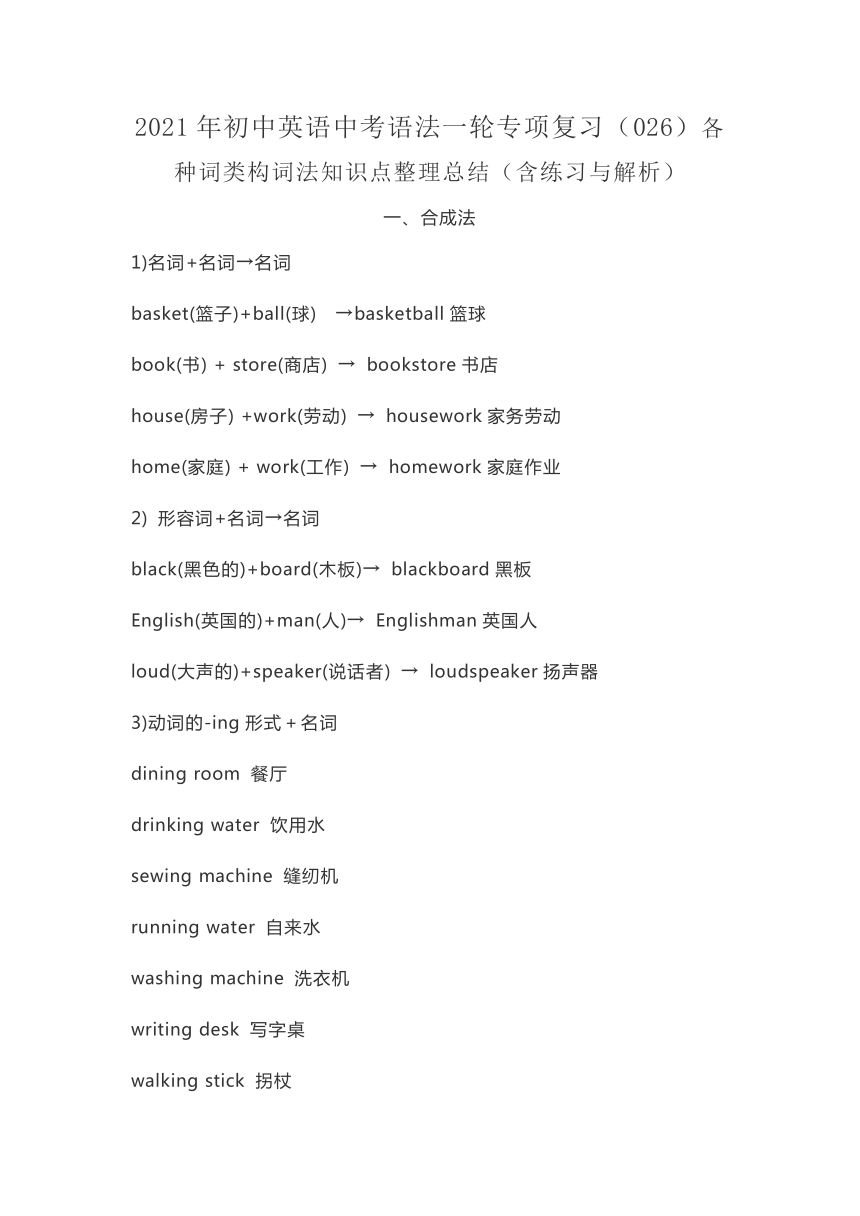
|
|
| 格式 | docx | ||
| 文件大小 | 24.5KB | ||
| 资源类型 | 教案 | ||
| 版本资源 | 人教新目标(Go for it)版 | ||
| 科目 | 英语 | ||
| 更新时间 | 2020-12-13 00:00:00 | ||
图片预览

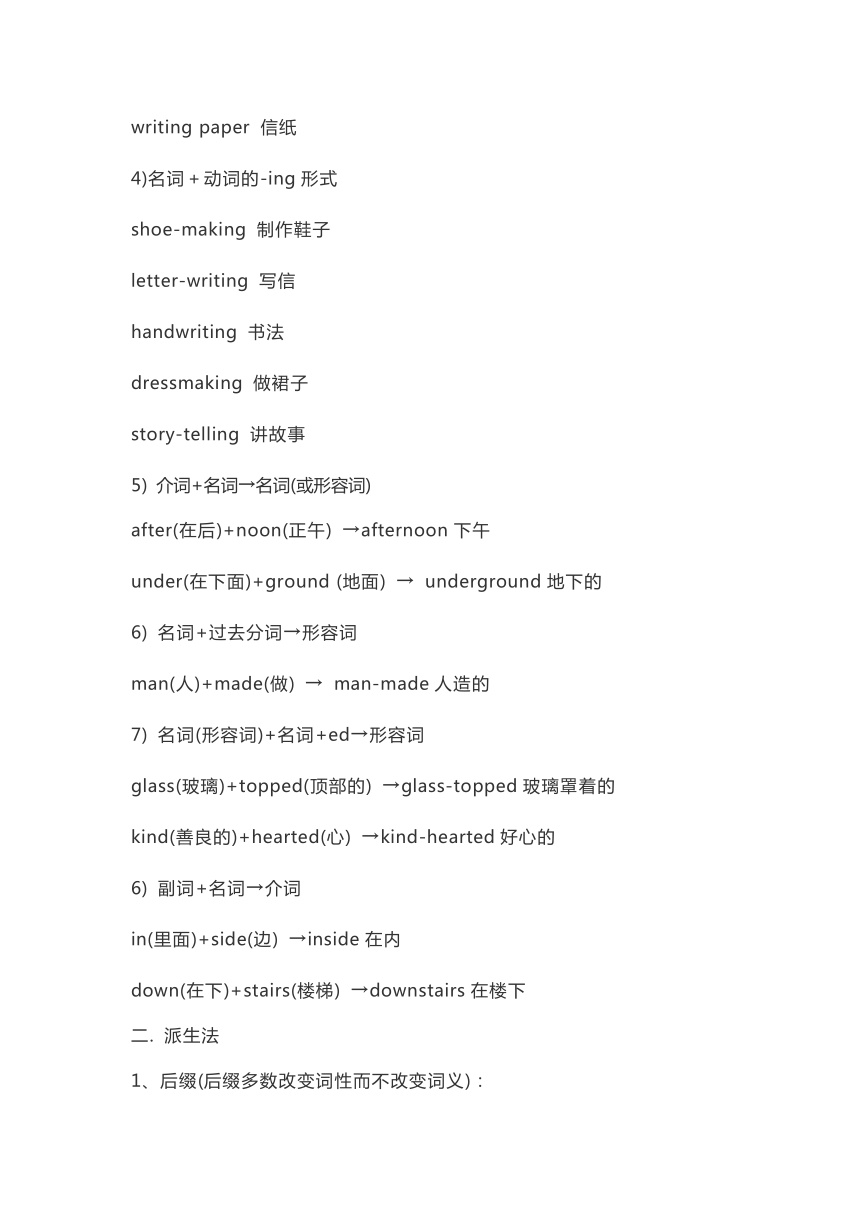
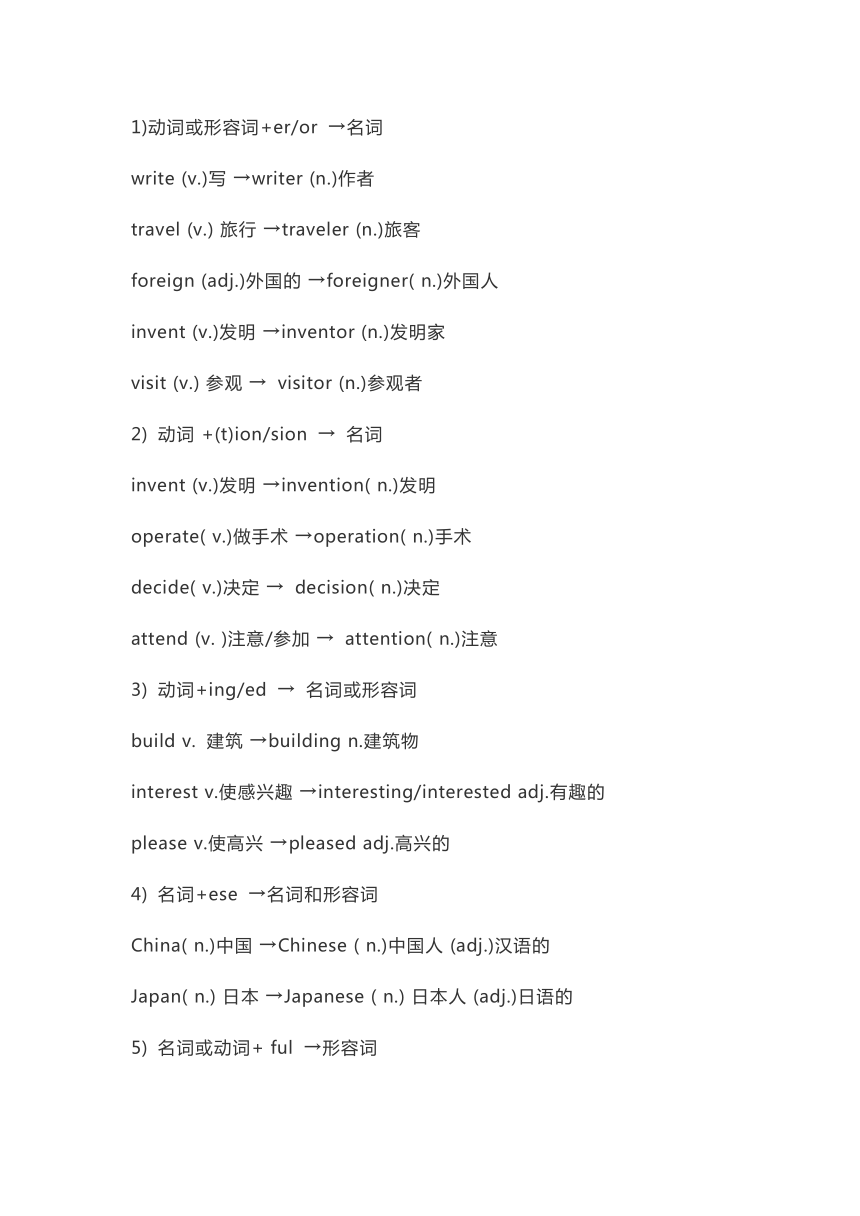
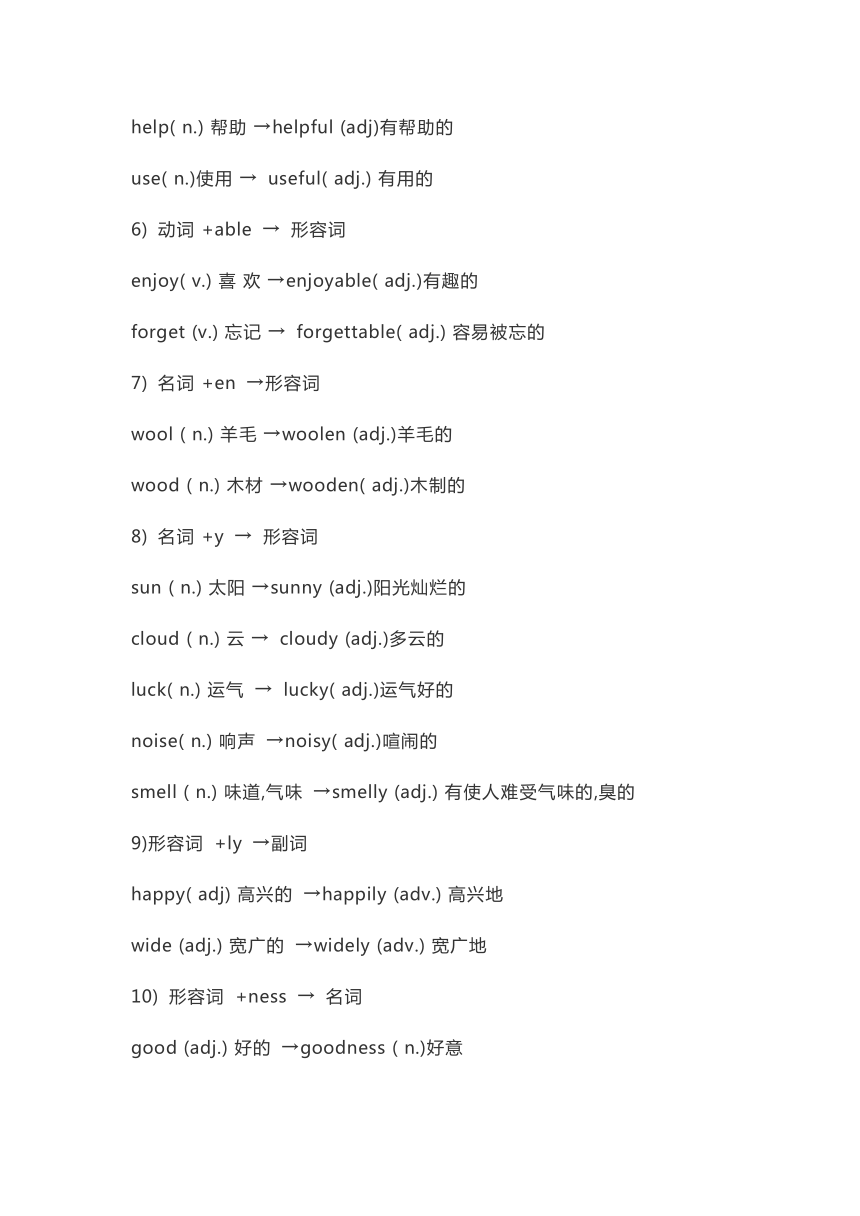
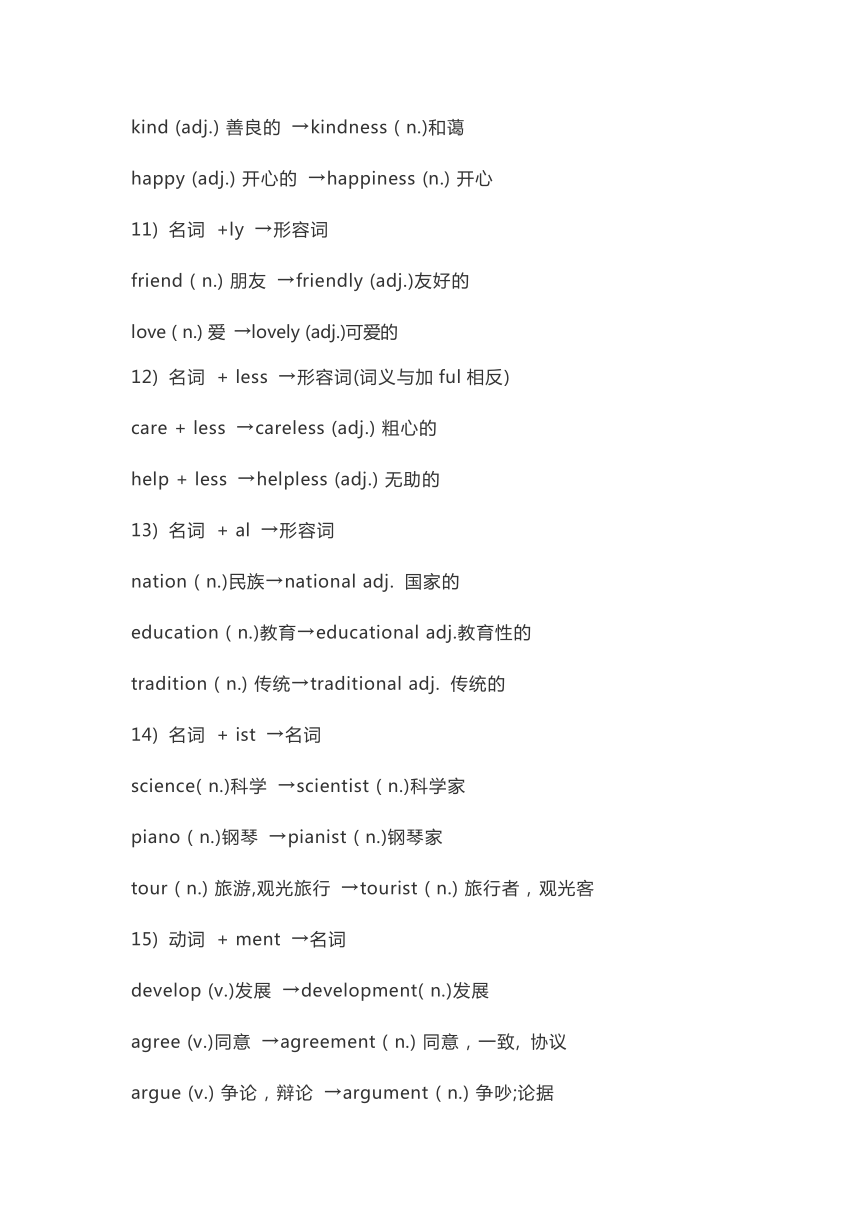
文档简介
10795000113919002021年初中英语中考语法一轮专项复习(026)各种词类构词法知识点整理总结(含练习与解析)
一、合成法
1)名词+名词→名词
basket(篮子)+ball(球) →basketball篮球? ?
book(书) + store(商店) → bookstore书店??
house(房子) +work(劳动) → housework家务劳动
home(家庭) + work(工作) → homework家庭作业
2) 形容词+名词→名词
black(黑色的)+board(木板)→ blackboard黑板?
English(英国的)+man(人)→ Englishman英国人
loud(大声的)+speaker(说话者) → loudspeaker扬声器
3)动词的-ing形式+名词
dining room 餐厅
drinking water 饮用水
sewing machine 缝纫机
running water 自来水
washing machine 洗衣机
writing desk 写字桌
walking stick 拐杖
writing paper 信纸
4)名词+动词的-ing形式
shoe-making 制作鞋子
letter-writing 写信
handwriting 书法
dressmaking 做裙子
story-telling 讲故事
5) 介词+名词→名词(或形容词)
after(在后)+noon(正午) →afternoon下午??
under(在下面)+ground (地面) → underground地下的
6) 名词+过去分词→形容词
man(人)+made(做) → man-made人造的
7) 名词(形容词)+名词+ed→形容词
glass(玻璃)+topped(顶部的) →glass-topped玻璃罩着的??
kind(善良的)+hearted(心) →kind-hearted好心的
6) 副词+名词→介词
in(里面)+side(边) →inside在内??
down(在下)+stairs(楼梯) →downstairs在楼下
二. 派生法
1、后缀(后缀多数改变词性而不改变词义):
1)动词或形容词+er/or →名词
write (v.)写?→writer (n.)作者??
travel (v.)?旅行?→traveler (n.)旅客??
foreign (adj.)外国的?→foreigner(?n.)外国人
invent (v.)发明?→inventor (n.)发明家??
visit (v.)?参观?→ visitor (n.)参观者
2) 动词?+(t)ion/sion → 名词
invent (v.)发明?→invention(?n.)发明??
operate(?v.)做手术?→operation(?n.)手术??
decide(?v.)决定?→ decision(?n.)决定????
attend (v. )注意/参加?→ attention(?n.)注意
3) 动词+ing/ed → 名词或形容词
build v. 建筑?→building n.建筑物??
interest v.使感兴趣?→interesting/interested adj.有趣的
please v.使高兴?→pleased adj.高兴的
4) 名词+ese →名词和形容词
China(?n.)中国?→Chinese (?n.)中国人?(adj.)汉语的?
Japan(?n.)?日本?→Japanese (?n.)?日本人?(adj.)日语的
5) 名词或动词+ ful →形容词
help(?n.)?帮助?→helpful (adj)有帮助的??
use(?n.)使用?→ useful(?adj.)?有用的
6) 动词?+able → 形容词
enjoy(?v.)?喜?欢?→enjoyable(?adj.)有趣的??
forget (v.)?忘记?→ forgettable(?adj.)?容易被忘的
7) 名词?+en →形容词
wool (?n.)?羊毛?→woolen (adj.)羊毛的??
wood (?n.)?木材?→wooden(?adj.)木制的
8) 名词?+y → 形容词
sun (?n.)?太阳?→sunny (adj.)阳光灿烂的??
cloud (?n.)?云?→ cloudy (adj.)多云的
luck(?n.)?运气 → lucky(?adj.)运气好的???
noise(?n.)?响声 →noisy(?adj.)喧闹的
smell (?n.)?味道,气味 →smelly (adj.)?有使人难受气味的,臭的
9)形容词 +ly →副词
happy(?adj)?高兴的 →happily (adv.)?高兴地??
wide (adj.)?宽广的 →widely (adv.)?宽广地
10) 形容词 +ness → 名词
good (adj.)?好的 →goodness (?n.)好意??
kind (adj.)?善良的 →kindness (?n.)和蔼
happy (adj.)?开心的 →happiness (n.)?开心
11) 名词 +ly →形容词
friend (?n.)?朋友 →friendly (adj.)友好的??
love (?n.)?爱 →lovely (adj.)可爱的
12) 名词 + less →形容词(词义与加ful相反)
care + less →careless (adj.)?粗心的??
help + less →helpless (adj.)?无助的
13) 名词 + al →形容词
nation (?n.)民族→national adj. 国家的??
education (?n.)教育→educational adj.教育性的
tradition (?n.)?传统→traditional adj. 传统的
14) 名词 + ist →名词
science(?n.)科学 →scientist (?n.)科学家??
piano (?n.)钢琴 →pianist (?n.)钢琴家
tour (?n.)?旅游,观光旅行 →tourist (?n.)?旅行者,观光客
15) 动词 + ment →名词
develop (v.)发展 →development(?n.)发展??
agree (v.)同意 →agreement (?n.)?同意,一致, 协议
argue (v.)?争论,辩论 →argument (?n.)?争吵;论据
16) 形容词 + ity →名词
able (adj.)?能够的 →ability (?n.)能力,
才能??possible (adj.)可能的→possibility (?n.)?可能性
real(?adj.)?真的,真实的 →reality(?n.)?现实,实际,真实
17) 名词 +ous →形容词
danger (?n.)危险 →dangerous (adj.)危险的
18) 名词 +ish →形容词
fool (?n.)?愚人,傻瓜 →foolish (adj.)愚蠢的,傻的??
child (?n.)孩子 →childish (adj.)孩子气的,幼稚的
book (?n.)?书 →bookish(?adj.)书生气的
19) 形容词或名词 +en →动词
wide (adj.)?广泛的,宽阔的 →widen (v.)?弄宽??
sharp(?adj.)?锋利的,急剧的 →sharpen (v.)?使...尖锐,锐利
fright(?n.)?惊吓 →frighten (v.)?使惊吓, 害怕,惊恐
20) 名词或形容词 +ify →动词
beauty (n.)美丽 →beautify (v.)?美化,变美,修饰??
simple (adj.)简单的 →simplify (v.)?简化,使单纯
21) 形容词 +ize →动词
real (adj.)?真的,真实的 →realize (v.)了解, 实现, 察觉;领悟??
memory (?n.)记忆力 →memorize (v.)记忆
22) 动词 +tive →形容词
act (v.)?行为,行动 →active (adj.)?积极的,主动的??
attract (v.)?吸引,有吸引力 →attractive (adj.)?有吸引力的
23)动词 +ess →名词(女性)
host (v.)主持,做东 →hostess (n.)?女主人??
act(?v.)?行动,扮演 →actress (n.)?女演员
wait (v.)等待,等候 →waitress(?n.)?女侍者,女服务员
2、前缀(前缀一般只改变词的意思而不改变其词性):
1) un- (不,非,表示否定,形容词前缀)
happy (高兴的) → unhappy(不高兴的)
like (像) → unlike(不像)
2) im- (不,无,非,表示否定,形容词前缀,常用在p, b, m开头的单词前)
possible (可能的) → impossible(不可能的)
polite (礼貌的)→ impolite(不礼貌的)
3) in- (不,无,非,表示否定,形容词前缀)
Active(活跃的) →inactive(不活跃的)
Complete(完全的) →incomplete 不完全的
4) dis-(不,非,表示否定,动词或形容词或名词前缀)
honest (诚实的)→dishonest(不诚实的)??
agree(同意) →disagree(不同意)
advantage优势→disadvantage不利,不利条件
5) mis- (表示错误)
understand (理解)→misunderstand (误解)
mistake (错误)→?misuse (误用)
6) re- (再,重复)
tell 叙述→ retell复述??
build 建筑 → rebuild 重建
write (写)→rewrite(重写)
7) bi- (两个、双边的)???bicolor 双色的
8) inter- (相互、交互、在一起)
interview, international, internet
9) tele- (远)? telephone, television
10) kilo- (千)
meter 米→kilometer 公里,千米
gram 克→kilogram 千克
11) micro- (微,小)
microwave oven 微波炉
microcomputer 微型电脑
12) sub- (下,次,亚,准,副)
subway 地铁,
sub-zero 零度以下的,
subcollege 准大学程度的,
subworker 助手,副手,
suboffice 分办事处,
subcompany分公司
三. 转化法
1) 名词→动词
rain n.雨 →rain v.下雨??
shop n. 商店 →shop v.购物
water n.水 →water v.浇水???
land n.陆地 →land v.着陆??
name n.名字 →name v.命名
[注意] 不少动词转化为名词或名词转化为动词,词义没有什么大变化,易于推测出词义。如:answer(回答),change(变化), fight(打架), love(爱), rest(休息), smile(微笑), shout(喊), study(学习), talk(谈话), visit(访问), wish(希望), work(工作)等。
2)形容词→动词
last adj.最后的 last v.持续??
tidy adj.整洁的 tidy v.使整洁??
own adj.自己的 own v.拥有
3) 形容词→名词
back adj.后面的 back n.背部,后面??
light adj.明亮的 light n.灯
4) 动词→名词
stop v.停止 stop n.车站??
lift v.举起 lift n.电梯
[注意]
?①词形不变,读音的差别(字母s读[z]为动词,读[s]为名词或形容词)
use v.使用 use n.用途
excuse v.原谅 excuse n.借口
②词形改变的转化:
live v.生活 life n.生活???
fill v.装满 full adj.满的???
save v.救 safe adj.安全的
enter v.进入 entrance n.入口处???
different adj.不同的???difference n.不同之处
注意:形容词---名词
important—importance???different—difference
四.缩写和简写
(1)剪切法:剪切法是指从某个词的完整形式中删除一个或更多音节,由此构成新词的方法。
①剪切原词的开始部分
bicycle—cycle 自行车
taxicab—cab 出租车
airplane/aeroplane—plane 飞机
?telephone—phone 电话
②剪切原词的中间部分
examination—exam 考试
taxicab—taxi 出租车
photograph—photo 图片
laboratory—lab 实验室
(2)混成法
混成法是指由两个词混合或紧缩而成为一个复合词的方法。这种复合词都保留了原来两个词的一部分,其后半部分表示主体,前半部分表示属性。
breakfast+lunch→brunch 早晨和中午之间的饭
smoke+fog→smog 浓烟
motor+hotel→motel 汽车旅馆
boat+motor→botor 电动船
news+broadcast→newscast 新闻广播
television+broadcast→telecast 电视广播
cheese+hamburger→cheeseburger 放有干酪的肉饼
beef+hamburger→beefburger 煎牛肉饼
European+television→Eurovision 欧洲电视网
?
构词法专项练习
根据句子的意义,用所给单词的正确形式填空。
1.It is one of the highest _______(build) in this city.
2.Liu Yutian is the first person to walk the whole _______(long) of the Great Wall.
3.I don’t know how to make the problem much _______(easy).
4.This baby just has three _______(tooth).
5.He was one of the _______(run) who won the race.
6.Look at the sun. Today is a _______(sun) day.
7.The students are enjoying _______(them) on the beach.
8.I’m afraid he’s made the wrong _______(decide) on that matter.
9.Mrs Brown became _______(worry) when she heard the news about her son.
10.Tony got the _______(two) place in the maths exam last month.
11.There is a _______(cut) machine in the middle of the workshop.
12.The wind blew _______(heavy) on the evening of Christmas Day.
13.Let’s have ten _______(minute) rest first, then we’ll go on collecting the litter.
14.Li Hua won the first place in the sports meet. He is the _______(proud) of our class.
15.Three Japanese _______(climber) were trapped on the mountain last Tuesday.
16.The TV play is so _______(interest) that I want to see it again.
17.Look! How _______(happy) the children are dancing!
18.The room next to mine is always _______(noise).
19.Don’t open your books. Please keep them _______(close).
20.The dictionary is very _______(help) to my study.
21.I’m going to give my sister some _______(beauty) flowers for her graduation.
22.The weather here is very fine. We have a lot of _______(sun) every day.
23.Among all his _______(invent), that is the most important one in his life.
24.A form was given Maggie to fill in her _______(person) information.
25.China is a _______country while America is a _______ country.(develop)
?答案及解析
1.buildings 这是这个城市里最高的建筑之一。用名词作宾语,building“建筑,建筑物”,符合题意。
2.length 刘玉田是第一个徒步走完长城的人。length意为“长度”,the length of the Great Wall意为“长城的长度”。
3.easier 我不知道怎样使这个问题变得容易些。much修饰比较级形式。
4.teeth 这个婴儿只有三颗牙。tooth的复数形式是teeth。
5.runners 他是在比赛中获胜的赛跑选手之一。runners为名词在主句中作表语,根据题意用复数形式。
6.sunny 看一下太阳。今天的天气很晴朗。用sun的形容词形式sunny作定语修饰day。
7.themselves 学生们正在海滩上尽情地玩耍。enjoy oneself意为“玩得高兴”,为固定用法。
8.decision 我恐怕他在那件事情上做了一个错误决定。用名词decision作动词的宾语。
9.worried 当布朗太太听到关于儿子的消息时,她变得担心起来。become后跟形容词作表语,故用worry的形容词形式worried。
10.second 托尼在上一个月的数学考试中获得了第二名。“第二”用序数词表示。
11.cutting 在车间的中间位置有一台切割机。用动名词作定语修饰名词,表示名词的用途。
12.heavily 圣诞之夜的风刮得很大。用副词heavily修饰动词blew,说明风刮得很大。
13.minutes’? 让我们先休息十分钟,然后接着收集垃圾。时间名词后用’s所有格,表示“多长时间”,在这里是十分钟的休息,所以用minute复数的所有格形式。
14.pride 李华在运动会上获得了第一名,他是我们班的骄傲。名词作表语,并且构成of所有格,所以用pride。
15.climbers 上周二三个日本登山者被困到了山上。用名词作主语,且根据题意要用复数形式。
16.interesting 这部电视剧是如此有趣,以至于我想再看一遍。interesting为现在分词作表语,表示“让人感到……的”。
17.happily 看!孩子们在多么欢快地跳舞呀!用副词修饰动词dance。
18.noisy 隔壁房间总是很吵闹。noisy意为“吵闹的”,为形容词,作表语修饰the room。
19.closed 不要打开你们的书,请合上它们。closed为形容词,作系动词keep的补语。
20.helpful 这本字典对于我的学习很有帮助。be helpful to意为“对……有作用”。
21.beautiful 我想为我妹妹的毕业送一些漂亮的花。beautiful为形容词作定语修饰flowers。
22.sunshine 这里的天气很好。我们每天都有充足的阳光。这里应用名词作宾语,根据题意用sunshine。
23.inventions 在他所有的发明中,那一件是他一生中最重要的。介词后面跟名词或代词。根据题意可知这里应用invent的名词形式invention。
24.personal 有人给了麦琪一张单子,要求她把个人信息填在上面。personal“个人的,私人的”,为形容词作定语,修饰information。
25.developing; developed 中国是一个发展中国家,而美国是一个发达国家。developing意为“发展中的”,developed意为“发达的”。
一、合成法
1)名词+名词→名词
basket(篮子)+ball(球) →basketball篮球? ?
book(书) + store(商店) → bookstore书店??
house(房子) +work(劳动) → housework家务劳动
home(家庭) + work(工作) → homework家庭作业
2) 形容词+名词→名词
black(黑色的)+board(木板)→ blackboard黑板?
English(英国的)+man(人)→ Englishman英国人
loud(大声的)+speaker(说话者) → loudspeaker扬声器
3)动词的-ing形式+名词
dining room 餐厅
drinking water 饮用水
sewing machine 缝纫机
running water 自来水
washing machine 洗衣机
writing desk 写字桌
walking stick 拐杖
writing paper 信纸
4)名词+动词的-ing形式
shoe-making 制作鞋子
letter-writing 写信
handwriting 书法
dressmaking 做裙子
story-telling 讲故事
5) 介词+名词→名词(或形容词)
after(在后)+noon(正午) →afternoon下午??
under(在下面)+ground (地面) → underground地下的
6) 名词+过去分词→形容词
man(人)+made(做) → man-made人造的
7) 名词(形容词)+名词+ed→形容词
glass(玻璃)+topped(顶部的) →glass-topped玻璃罩着的??
kind(善良的)+hearted(心) →kind-hearted好心的
6) 副词+名词→介词
in(里面)+side(边) →inside在内??
down(在下)+stairs(楼梯) →downstairs在楼下
二. 派生法
1、后缀(后缀多数改变词性而不改变词义):
1)动词或形容词+er/or →名词
write (v.)写?→writer (n.)作者??
travel (v.)?旅行?→traveler (n.)旅客??
foreign (adj.)外国的?→foreigner(?n.)外国人
invent (v.)发明?→inventor (n.)发明家??
visit (v.)?参观?→ visitor (n.)参观者
2) 动词?+(t)ion/sion → 名词
invent (v.)发明?→invention(?n.)发明??
operate(?v.)做手术?→operation(?n.)手术??
decide(?v.)决定?→ decision(?n.)决定????
attend (v. )注意/参加?→ attention(?n.)注意
3) 动词+ing/ed → 名词或形容词
build v. 建筑?→building n.建筑物??
interest v.使感兴趣?→interesting/interested adj.有趣的
please v.使高兴?→pleased adj.高兴的
4) 名词+ese →名词和形容词
China(?n.)中国?→Chinese (?n.)中国人?(adj.)汉语的?
Japan(?n.)?日本?→Japanese (?n.)?日本人?(adj.)日语的
5) 名词或动词+ ful →形容词
help(?n.)?帮助?→helpful (adj)有帮助的??
use(?n.)使用?→ useful(?adj.)?有用的
6) 动词?+able → 形容词
enjoy(?v.)?喜?欢?→enjoyable(?adj.)有趣的??
forget (v.)?忘记?→ forgettable(?adj.)?容易被忘的
7) 名词?+en →形容词
wool (?n.)?羊毛?→woolen (adj.)羊毛的??
wood (?n.)?木材?→wooden(?adj.)木制的
8) 名词?+y → 形容词
sun (?n.)?太阳?→sunny (adj.)阳光灿烂的??
cloud (?n.)?云?→ cloudy (adj.)多云的
luck(?n.)?运气 → lucky(?adj.)运气好的???
noise(?n.)?响声 →noisy(?adj.)喧闹的
smell (?n.)?味道,气味 →smelly (adj.)?有使人难受气味的,臭的
9)形容词 +ly →副词
happy(?adj)?高兴的 →happily (adv.)?高兴地??
wide (adj.)?宽广的 →widely (adv.)?宽广地
10) 形容词 +ness → 名词
good (adj.)?好的 →goodness (?n.)好意??
kind (adj.)?善良的 →kindness (?n.)和蔼
happy (adj.)?开心的 →happiness (n.)?开心
11) 名词 +ly →形容词
friend (?n.)?朋友 →friendly (adj.)友好的??
love (?n.)?爱 →lovely (adj.)可爱的
12) 名词 + less →形容词(词义与加ful相反)
care + less →careless (adj.)?粗心的??
help + less →helpless (adj.)?无助的
13) 名词 + al →形容词
nation (?n.)民族→national adj. 国家的??
education (?n.)教育→educational adj.教育性的
tradition (?n.)?传统→traditional adj. 传统的
14) 名词 + ist →名词
science(?n.)科学 →scientist (?n.)科学家??
piano (?n.)钢琴 →pianist (?n.)钢琴家
tour (?n.)?旅游,观光旅行 →tourist (?n.)?旅行者,观光客
15) 动词 + ment →名词
develop (v.)发展 →development(?n.)发展??
agree (v.)同意 →agreement (?n.)?同意,一致, 协议
argue (v.)?争论,辩论 →argument (?n.)?争吵;论据
16) 形容词 + ity →名词
able (adj.)?能够的 →ability (?n.)能力,
才能??possible (adj.)可能的→possibility (?n.)?可能性
real(?adj.)?真的,真实的 →reality(?n.)?现实,实际,真实
17) 名词 +ous →形容词
danger (?n.)危险 →dangerous (adj.)危险的
18) 名词 +ish →形容词
fool (?n.)?愚人,傻瓜 →foolish (adj.)愚蠢的,傻的??
child (?n.)孩子 →childish (adj.)孩子气的,幼稚的
book (?n.)?书 →bookish(?adj.)书生气的
19) 形容词或名词 +en →动词
wide (adj.)?广泛的,宽阔的 →widen (v.)?弄宽??
sharp(?adj.)?锋利的,急剧的 →sharpen (v.)?使...尖锐,锐利
fright(?n.)?惊吓 →frighten (v.)?使惊吓, 害怕,惊恐
20) 名词或形容词 +ify →动词
beauty (n.)美丽 →beautify (v.)?美化,变美,修饰??
simple (adj.)简单的 →simplify (v.)?简化,使单纯
21) 形容词 +ize →动词
real (adj.)?真的,真实的 →realize (v.)了解, 实现, 察觉;领悟??
memory (?n.)记忆力 →memorize (v.)记忆
22) 动词 +tive →形容词
act (v.)?行为,行动 →active (adj.)?积极的,主动的??
attract (v.)?吸引,有吸引力 →attractive (adj.)?有吸引力的
23)动词 +ess →名词(女性)
host (v.)主持,做东 →hostess (n.)?女主人??
act(?v.)?行动,扮演 →actress (n.)?女演员
wait (v.)等待,等候 →waitress(?n.)?女侍者,女服务员
2、前缀(前缀一般只改变词的意思而不改变其词性):
1) un- (不,非,表示否定,形容词前缀)
happy (高兴的) → unhappy(不高兴的)
like (像) → unlike(不像)
2) im- (不,无,非,表示否定,形容词前缀,常用在p, b, m开头的单词前)
possible (可能的) → impossible(不可能的)
polite (礼貌的)→ impolite(不礼貌的)
3) in- (不,无,非,表示否定,形容词前缀)
Active(活跃的) →inactive(不活跃的)
Complete(完全的) →incomplete 不完全的
4) dis-(不,非,表示否定,动词或形容词或名词前缀)
honest (诚实的)→dishonest(不诚实的)??
agree(同意) →disagree(不同意)
advantage优势→disadvantage不利,不利条件
5) mis- (表示错误)
understand (理解)→misunderstand (误解)
mistake (错误)→?misuse (误用)
6) re- (再,重复)
tell 叙述→ retell复述??
build 建筑 → rebuild 重建
write (写)→rewrite(重写)
7) bi- (两个、双边的)???bicolor 双色的
8) inter- (相互、交互、在一起)
interview, international, internet
9) tele- (远)? telephone, television
10) kilo- (千)
meter 米→kilometer 公里,千米
gram 克→kilogram 千克
11) micro- (微,小)
microwave oven 微波炉
microcomputer 微型电脑
12) sub- (下,次,亚,准,副)
subway 地铁,
sub-zero 零度以下的,
subcollege 准大学程度的,
subworker 助手,副手,
suboffice 分办事处,
subcompany分公司
三. 转化法
1) 名词→动词
rain n.雨 →rain v.下雨??
shop n. 商店 →shop v.购物
water n.水 →water v.浇水???
land n.陆地 →land v.着陆??
name n.名字 →name v.命名
[注意] 不少动词转化为名词或名词转化为动词,词义没有什么大变化,易于推测出词义。如:answer(回答),change(变化), fight(打架), love(爱), rest(休息), smile(微笑), shout(喊), study(学习), talk(谈话), visit(访问), wish(希望), work(工作)等。
2)形容词→动词
last adj.最后的 last v.持续??
tidy adj.整洁的 tidy v.使整洁??
own adj.自己的 own v.拥有
3) 形容词→名词
back adj.后面的 back n.背部,后面??
light adj.明亮的 light n.灯
4) 动词→名词
stop v.停止 stop n.车站??
lift v.举起 lift n.电梯
[注意]
?①词形不变,读音的差别(字母s读[z]为动词,读[s]为名词或形容词)
use v.使用 use n.用途
excuse v.原谅 excuse n.借口
②词形改变的转化:
live v.生活 life n.生活???
fill v.装满 full adj.满的???
save v.救 safe adj.安全的
enter v.进入 entrance n.入口处???
different adj.不同的???difference n.不同之处
注意:形容词---名词
important—importance???different—difference
四.缩写和简写
(1)剪切法:剪切法是指从某个词的完整形式中删除一个或更多音节,由此构成新词的方法。
①剪切原词的开始部分
bicycle—cycle 自行车
taxicab—cab 出租车
airplane/aeroplane—plane 飞机
?telephone—phone 电话
②剪切原词的中间部分
examination—exam 考试
taxicab—taxi 出租车
photograph—photo 图片
laboratory—lab 实验室
(2)混成法
混成法是指由两个词混合或紧缩而成为一个复合词的方法。这种复合词都保留了原来两个词的一部分,其后半部分表示主体,前半部分表示属性。
breakfast+lunch→brunch 早晨和中午之间的饭
smoke+fog→smog 浓烟
motor+hotel→motel 汽车旅馆
boat+motor→botor 电动船
news+broadcast→newscast 新闻广播
television+broadcast→telecast 电视广播
cheese+hamburger→cheeseburger 放有干酪的肉饼
beef+hamburger→beefburger 煎牛肉饼
European+television→Eurovision 欧洲电视网
?
构词法专项练习
根据句子的意义,用所给单词的正确形式填空。
1.It is one of the highest _______(build) in this city.
2.Liu Yutian is the first person to walk the whole _______(long) of the Great Wall.
3.I don’t know how to make the problem much _______(easy).
4.This baby just has three _______(tooth).
5.He was one of the _______(run) who won the race.
6.Look at the sun. Today is a _______(sun) day.
7.The students are enjoying _______(them) on the beach.
8.I’m afraid he’s made the wrong _______(decide) on that matter.
9.Mrs Brown became _______(worry) when she heard the news about her son.
10.Tony got the _______(two) place in the maths exam last month.
11.There is a _______(cut) machine in the middle of the workshop.
12.The wind blew _______(heavy) on the evening of Christmas Day.
13.Let’s have ten _______(minute) rest first, then we’ll go on collecting the litter.
14.Li Hua won the first place in the sports meet. He is the _______(proud) of our class.
15.Three Japanese _______(climber) were trapped on the mountain last Tuesday.
16.The TV play is so _______(interest) that I want to see it again.
17.Look! How _______(happy) the children are dancing!
18.The room next to mine is always _______(noise).
19.Don’t open your books. Please keep them _______(close).
20.The dictionary is very _______(help) to my study.
21.I’m going to give my sister some _______(beauty) flowers for her graduation.
22.The weather here is very fine. We have a lot of _______(sun) every day.
23.Among all his _______(invent), that is the most important one in his life.
24.A form was given Maggie to fill in her _______(person) information.
25.China is a _______country while America is a _______ country.(develop)
?答案及解析
1.buildings 这是这个城市里最高的建筑之一。用名词作宾语,building“建筑,建筑物”,符合题意。
2.length 刘玉田是第一个徒步走完长城的人。length意为“长度”,the length of the Great Wall意为“长城的长度”。
3.easier 我不知道怎样使这个问题变得容易些。much修饰比较级形式。
4.teeth 这个婴儿只有三颗牙。tooth的复数形式是teeth。
5.runners 他是在比赛中获胜的赛跑选手之一。runners为名词在主句中作表语,根据题意用复数形式。
6.sunny 看一下太阳。今天的天气很晴朗。用sun的形容词形式sunny作定语修饰day。
7.themselves 学生们正在海滩上尽情地玩耍。enjoy oneself意为“玩得高兴”,为固定用法。
8.decision 我恐怕他在那件事情上做了一个错误决定。用名词decision作动词的宾语。
9.worried 当布朗太太听到关于儿子的消息时,她变得担心起来。become后跟形容词作表语,故用worry的形容词形式worried。
10.second 托尼在上一个月的数学考试中获得了第二名。“第二”用序数词表示。
11.cutting 在车间的中间位置有一台切割机。用动名词作定语修饰名词,表示名词的用途。
12.heavily 圣诞之夜的风刮得很大。用副词heavily修饰动词blew,说明风刮得很大。
13.minutes’? 让我们先休息十分钟,然后接着收集垃圾。时间名词后用’s所有格,表示“多长时间”,在这里是十分钟的休息,所以用minute复数的所有格形式。
14.pride 李华在运动会上获得了第一名,他是我们班的骄傲。名词作表语,并且构成of所有格,所以用pride。
15.climbers 上周二三个日本登山者被困到了山上。用名词作主语,且根据题意要用复数形式。
16.interesting 这部电视剧是如此有趣,以至于我想再看一遍。interesting为现在分词作表语,表示“让人感到……的”。
17.happily 看!孩子们在多么欢快地跳舞呀!用副词修饰动词dance。
18.noisy 隔壁房间总是很吵闹。noisy意为“吵闹的”,为形容词,作表语修饰the room。
19.closed 不要打开你们的书,请合上它们。closed为形容词,作系动词keep的补语。
20.helpful 这本字典对于我的学习很有帮助。be helpful to意为“对……有作用”。
21.beautiful 我想为我妹妹的毕业送一些漂亮的花。beautiful为形容词作定语修饰flowers。
22.sunshine 这里的天气很好。我们每天都有充足的阳光。这里应用名词作宾语,根据题意用sunshine。
23.inventions 在他所有的发明中,那一件是他一生中最重要的。介词后面跟名词或代词。根据题意可知这里应用invent的名词形式invention。
24.personal 有人给了麦琪一张单子,要求她把个人信息填在上面。personal“个人的,私人的”,为形容词作定语,修饰information。
25.developing; developed 中国是一个发展中国家,而美国是一个发达国家。developing意为“发展中的”,developed意为“发达的”。
同课章节目录
- 词法
- 名词
- 动词和动词短语
- 动词语态
- 动词时态
- 助动词和情态动词
- 非谓语动词
- 冠词
- 代词
- 数词和量词
- 形容词副词及其比较等级
- 介词和介词短语
- 连词和感叹词
- 构词法
- 相似、相近词比较
- 句法
- 陈述句
- 一般疑问句和否定疑问句
- 特殊疑问句及选择疑问句
- 反意疑问句
- 存在句(There be句型)
- 宾语从句
- 定语从句
- 状语从句
- 主谓一致问题
- 简单句
- 并列句
- 复合句
- 主谓一致
- 主、表语从句
- 名词性从句
- 直接引语和间接引语
- 虚拟语气
- 感叹句
- 强调句
- 倒装句
- 祈使句
- 句子的成分
- 句子的分类
- 题型专区
- 单项选择部分
- 易错题
- 完形填空
- 阅读理解
- 词汇练习
- 听说训练
- 句型转换
- 补全对话
- 短文改错
- 翻译
- 书面表达
- 任务型阅读
- 语法填空
- 其他资料
